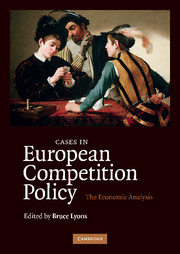Book contents
- Frontmatter
- Contents
- Contents by potentially anticompetitive business practices
- Contents by markets
- List of figures
- List of tables
- List of contributors
- Preface
- Introduction: the transformation of competition policy in Europe
- A Anticompetitive behaviour by firms with market power
- B Agreements between firms
- Introduction
- B.1 Cartels
- B.2 Other horizontal agreements
- B.3 Vertical agreements
- 9 Efficiency enhancing or anticompetitive vertical restraints? Selective and exclusive car distribution in Europe
- 10 Beer – the ties that bind
- 11 Parallel trade of prescription medicines: the Glaxo Dual Pricing case
- C Mergers
- Bibliography
- Index
11 - Parallel trade of prescription medicines: the Glaxo Dual Pricing case
Published online by Cambridge University Press: 05 June 2012
- Frontmatter
- Contents
- Contents by potentially anticompetitive business practices
- Contents by markets
- List of figures
- List of tables
- List of contributors
- Preface
- Introduction: the transformation of competition policy in Europe
- A Anticompetitive behaviour by firms with market power
- B Agreements between firms
- Introduction
- B.1 Cartels
- B.2 Other horizontal agreements
- B.3 Vertical agreements
- 9 Efficiency enhancing or anticompetitive vertical restraints? Selective and exclusive car distribution in Europe
- 10 Beer – the ties that bind
- 11 Parallel trade of prescription medicines: the Glaxo Dual Pricing case
- C Mergers
- Bibliography
- Index
Summary
Background
The prices of prescription medicines in the European Union are for the most part determined by measures adopted by the national health authorities of the various Member States and tend to differ substantially from country to country as a result of the different budgetary policies and priorities of the Member States concerned. These price differences inevitably give rise to significant arbitrage opportunities and have been the source of a flourishing parallel trade in prescription pharmaceuticals from low- to high-priced countries.
The Glaxo Dual Pricing case relates to a practice under which Glaxo sold its medicines to Spanish wholesalers at prices differentiated according to where the medicine would be consumed. Thus, the price for a medicine to be sold in Spain was set at the level mandated by the relevant Spanish pricing legislation. Products for export were sold at a price freely determined by Glaxo as permitted under Spanish law. In this way, Glaxo was able to sell in Spain at the government-required low price for domestic consumption but at a higher price if the product was to be re-exported to countries willing to pay more, notably the UK. Thus, while not explicitly prohibiting parallel trade, the practice had the effect of reducing the incentives for wholesalers to re-export.
The EU goal of market integration as an overriding policy consideration has led the European Commission to treat the prevention or limitation of parallel trade as a hard-core restriction which has frequently attracted heavy fines, irrespective of the products and the regulatory environment in question.
- Type
- Chapter
- Information
- Cases in European Competition PolicyThe Economic Analysis, pp. 268 - 282Publisher: Cambridge University PressPrint publication year: 2009
- 2
- Cited by



